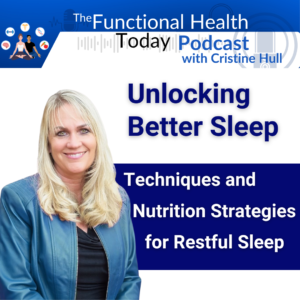
Did You Enjoy This Podcast?
Are you ready to discover practical strategies to improve your mental health?
Join Cristine Hull, an expert in natural medicine and mental health counseling, as she shares insights from her extensive experience.
Uncover tools to help balance your brain chemistry and enhance your well-being!
 Imagine tossing and turning in bed, desperately trying to find a comfortable position, but sleep eludes you. You’re not alone. Statistics reveal that nearly 70 million Americans suffer from sleep disorders, making quality sleep increasingly elusive. However, a combination of effective sleep techniques and nutrition strategies can pave the way to more restful nights.
Imagine tossing and turning in bed, desperately trying to find a comfortable position, but sleep eludes you. You’re not alone. Statistics reveal that nearly 70 million Americans suffer from sleep disorders, making quality sleep increasingly elusive. However, a combination of effective sleep techniques and nutrition strategies can pave the way to more restful nights.
What are Effective Tips for Better Sleep?
🌜 Understanding Sleep Cycles
The journey to better sleep begins by understanding your sleep cycles. Your body moves through different stages during the night—beta, alpha, theta, and delta. Each stage plays a crucial role in overall rest and well-being. To achieve optimal sleep, it’s essential to transition smoothly from a state of alertness (beta) to relaxation (alpha and theta) before entering the deep, restorative sleep (delta).

Pop in your email below, and we’ll zip it straight to your inbox so you never lose it!
💧 Hydration for Sleep Quality
A surprising yet vital component of achieving better sleep is hydration. The body needs a proper balance of minerals, such as sodium, potassium, calcium, and magnesium. These minerals support cellular functions that allow the brain and body to wind down at night. Being well-hydrated improves not only your physical health but also helps you relax and fall asleep easier.
🥗 Nutrition Choices Matter
Certain nutritional strategies can aid in promoting better sleep. Eating a balanced diet rich in nutrients can influence your body’s ability to manage stress and promote relaxation. Incorporating foods high in magnesium, such as leafy greens and nuts, can significantly enhance sleep quality. In contrast, a diet high in processed sugars can lead to disrupted sleep patterns.
🌱 Mind Your Evening Routine
Establishing a calming bedtime routine can signal to your body that it’s time to unwind. Engaging in activities that promote relaxation, such as gentle yoga or reading, helps your body taper off from the day’s busyness. A well-structured routine also enables your mind to transition into a restful state, which is essential for deep sleep.
How can sleep hygiene improve your sleep quality?

According to the NIH’s News in Health, sleep is just as essential to your overall health as diet and exercise. Prioritizing good sleep can enhance brain performance, mood, and overall well-being.
Sleep hygiene plays a crucial role in enhancing sleep quality and duration. By establishing a consistent routine, individuals can reduce sleep disturbances and poor sleep patterns. This can help influence our sleep positively, ensuring adequate sleep duration and allowing for all stages of sleep, including REM sleep.
Furthermore, maintaining a healthy diet on sleep, such as avoiding eating late at night, has been shown to improve sleep quality. Addressing issues like obstructive sleep apnea through appropriate sleep medicine can help promote sleep and mitigate the effects of sleep debt. Ultimately, better rest leads to improved overall health.
A well-rounded approach that includes understanding your sleep cycles, staying hydrated, eating well, and following a nightly routine can drastically improve sleep quality. As you incorporate these strategies, you’ll not only enhance your nighttime rest but also your overall well-being. Embrace the journey toward restful sleep and transform your wakefulness into refreshing energy for the day ahead.
How Does Nutrition and Sleep Influence Each Other?
Sleep is essential for overall health, and its impact on sleep quality and quantity is profound. A balanced diet can help you sleep better at night by providing the necessary nutrients that influence sleep patterns. Nutrition tips, like avoiding heavy meals before bedtime, can help sleep duration and quality.
The relationship between nutrition and sleep is crucial; certain foods may affect your sleep positively. For example, foods rich in magnesium have been found to improve sleep, while high sugar intake can lead to poor sleep quality. Keeping a sleep journal can help you track how nutrition may impact your sleep quality.
Aim for the recommended amount of sleep, as sleep later or poor dietary choices can lead to reduced total sleep time and sleep duration and quality. Incorporating healthy foods at dinnertime can help sleep and ensure you sleep better at night.
How can eating habits affect sleep quality?
Nutrition plays a crucial role in maintaining your sleep quality. Eating heavy meals later in the night can lead to irregular sleep, while a balanced diet may improve sleep patterns. Following sleep tips from the American Academy of Sleep Medicine can help with sleep for a healthy adult.
Consuming healthy sleep foods, such as those rich in tryptophan, can be conducive to sleep and support your circadian rhythm sleep. This, in turn, may lead to better sleep and enhance your overall well-being. A good night’s sleep is essential to meet your need for sleep and combat sleep issues.
By prioritizing sleep and nutrition, you can effectively make sleep a priority. With the right choices, sleep may become more restorative, allowing you to maintain your sleep and wake cycles. Ultimately, paying attention to your eating habits can significantly affect sleep quality and ensure a restful night’s sleep.
If you’re seeking nutrition tips to improve sleep and find relief from sleep apnea, this guide from Healthy Jeena Sikho provides practical strategies to enhance your rest.
Did You Enjoy This Podcast?
Are you ready to discover practical strategies to improve your mental health?
Join Cristine Hull, an expert in natural medicine and mental health counseling, as she shares insights from her extensive experience.
Uncover tools to help balance your brain chemistry and enhance your well-being!














